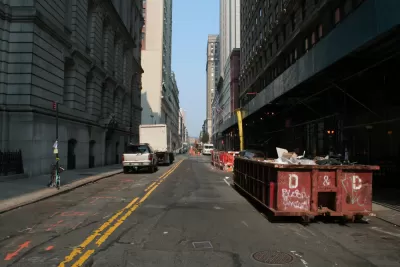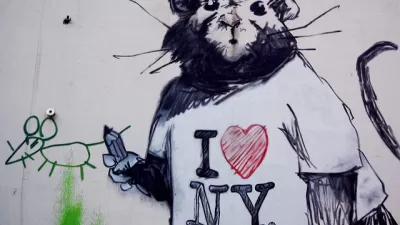The de Blasio Administration has recommended that the city of New York is ready to collect its trash in a new way, with a system known as franchising.

David Giambusso reports that New York City will "begin implementing a 'zoned-collection' system for the city's private carting industry…" According to Giambusso, the change represents "an historic change in how commercial waste is collected and managed in New York City."
In a report that's scheduled to be released Wednesday, the de Blasio administration will argue a zoned-collection system, known elsewhere as 'franchising,' will dramatically reduce vehicle emissions while also giving the city much greater regulatory authority over an industry critics have likened to the wild west.
The New York State Department of Sanitation collects all residential waste in the city, but private contractors collect waste from "virtually all of the waste collected from businesses, both large and small," explains Giambusso. The private trash collectors are heavily criticized by labor and environmental groups, however, leading to the de Blasio Administration's actions.
Zone collection essentially means the city will be divided into zones and contractors will be allowed to bid on specific sectors. Now, a single city block can be serviced by more than a dozen different companies, leading to inefficient routes, excessive pollution and traffic.
The report expects that efficiencies gained from a zoned system will also drive down trash collection prices.
It could take "two years for the city to develop a plan and another three years or more to implement it," reports Giambusso, and "the City Council will have to pass legislation to codify the changes."

Planetizen Federal Action Tracker
A weekly monitor of how Trump’s orders and actions are impacting planners and planning in America.

Chicago’s Ghost Rails
Just beneath the surface of the modern city lie the remnants of its expansive early 20th-century streetcar system.

San Antonio and Austin are Fusing Into one Massive Megaregion
The region spanning the two central Texas cities is growing fast, posing challenges for local infrastructure and water supplies.

Since Zion's Shuttles Went Electric “The Smog is Gone”
Visitors to Zion National Park can enjoy the canyon via the nation’s first fully electric park shuttle system.

Trump Distributing DOT Safety Funds at 1/10 Rate of Biden
Funds for Safe Streets and other transportation safety and equity programs are being held up by administrative reviews and conflicts with the Trump administration’s priorities.

German Cities Subsidize Taxis for Women Amid Wave of Violence
Free or low-cost taxi rides can help women navigate cities more safely, but critics say the programs don't address the root causes of violence against women.
Urban Design for Planners 1: Software Tools
This six-course series explores essential urban design concepts using open source software and equips planners with the tools they need to participate fully in the urban design process.
Planning for Universal Design
Learn the tools for implementing Universal Design in planning regulations.
planning NEXT
Appalachian Highlands Housing Partners
Mpact (founded as Rail~Volution)
City of Camden Redevelopment Agency
City of Astoria
City of Portland
City of Laramie





























